| Srl | Item |
| 1 |
ID:
184398
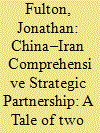

|
|
|
|
|
| Summary/Abstract |
The China-Iran comprehensive strategic partnership (CSP) has been described as a potentially disruptive alignment. This article analyses the impact of the CSP in two regional security complexes (RSCs): the Persian Gulf and South Asia. It finds that of the two RSCs, the China-Iran CSP has a greater likelihood of affecting the strategic landscape of the South Asian RSC as China seeks to contain India's power and influence. In the Persian Gulf, China's economically-motivated regional presence is supported by the maintenance of the status quo, and as a result the CSP is not likely to adversely affect that RSC.
|
|
|
|
|
|
|
|
|
|
|
|
|
|
|
|
| 2 |
ID:
172442
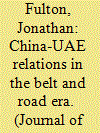

|
|
|
|
|
| Summary/Abstract |
In the summer of 2018 China and the United Arab Emirates (UAE) upgraded their bilateral relationship to a comprehensive strategic partnership, China’s highest level of diplomatic relations. This follows a trajectory of deepening multifaceted ties that has been steadily becoming strategically important for both states, especially as China’s Belt and Road Initiative (BRI), launched in 2013, results in deeper engagement in the Middle East. This article examines the features of the China-UAE relationship, providing an original historical framework that explains the context of relations through four periods prior to the BRI: indifference, hostility, transition, and interdependence. It then analyzes developments in the bilateral relationship during the early stages of the BRI, demonstrating that the UAE has become a key partner for China in its Middle East policy.
|
|
|
|
|
|
|
|
|
|
|
|
|
|
|
|
| 3 |
ID:
171035
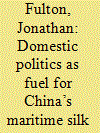

|
|
|
|
|
| Summary/Abstract |
China’s involvement with the Gulf monarchies has been built upon an economic foundation. With the Belt and Road Initiative (BRI) and the Maritime Silk Road Initiative (MSRI) this has expanded, as the Gulf monarchies see cooperation with China through MSRI projects as a means of advancing economic development programs necessary to move beyond single-resource rentier economies and relationships with external powers as a means of ensuring their security in an unstable region. This has important implications for the shape of the MSRI as a whole, and how it fits together with the larger BRI. China’s BRI/MSRI success with participating states will be a matter of matching their specific domestic needs and strategic considerations with Chinese perceptions of the relative importance of those states.
|
|
|
|
|
|
|
|
|
|
|
|
|
|
|
|
| 4 |
ID:
183518


|
|
|
|
|
| Summary/Abstract |
The transition away from post-Cold War unipolarity has repercussions for regional orders that have been shaped and sustained by US preponderance. Small states like the United Arab Emirates (UAE), traditionally reliant upon extra-regional powers to balance against more powerful neighbours, are adopting an increasingly muscular foreign policy to hedge against a possible reduced US regional role. Consequently, there is an opening for non-traditional powers to adopt larger roles. Primarily using an outside-in approach, this paper explores the nature of China and Russia’s more active bilateral engagement with the UAE. It finds that in an environment where political instability within the larger Middle East combines with uncertainty about US intentions, regional leaders and leaders of extra-regional powers with interests in the Persian Gulf have to adjust accordingly, either to protect those interests or to take advantage of the opportunity to expand their presence in a strategically and economically important theatre.
|
|
|
|
|
|
|
|
|
|
|
|
|
|
|
|
| 5 |
ID:
188166
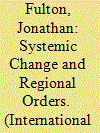

|
|
|
|
|
| Summary/Abstract |
The Persian Gulf regional security complex is shaped by intense competition between regional states and, since the aftermath of Operation Desert Storm, US military preponderance. US security cooperation with the Gulf Cooperation Council member states has sustained a status quo that has allowed extra-regional countries to advance their interests without making significant contributions to regional stability. An examination of the presence of five Asian countries (China, India, Japan, Singapore and South Korea) in the Gulf suggests that, as the US signals intentions to reduce its security commitments to the region, the perception of hegemonic retreat will influence the regional policies adopted by these Asian countries. A further and related consideration is the ‘great-power competition’ narrative that is driving politics at the systemic level. The US-China bilateral relationship will have a significant impact on extra-regional powers’ approach to the Gulf.
|
|
|
|
|
|
|
|
|
|
|
|
|
|
|
|
| 6 |
ID:
182036
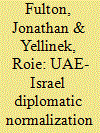

|
|
|
|
|
| Summary/Abstract |
The announcement of normalized diplomatic relations between Israel and the United Arab Emirates (UAE) is a significant event in Middle East international politics, marking the first new regional partnership for Israel since Jordan in 1994. This paper uses a levels of analysis approach to examine the domestic, regional, and systemic pressures that influenced leaders in the two countries to make this bold decision. It argues that the pressures at the domestic and systemic levels are important considerations, but the dynamics at play in the Middle East regional security complex are ultimately more important factors in explaining normalization.
|
|
|
|
|
|
|
|
|
|
|
|
|
|
|
|